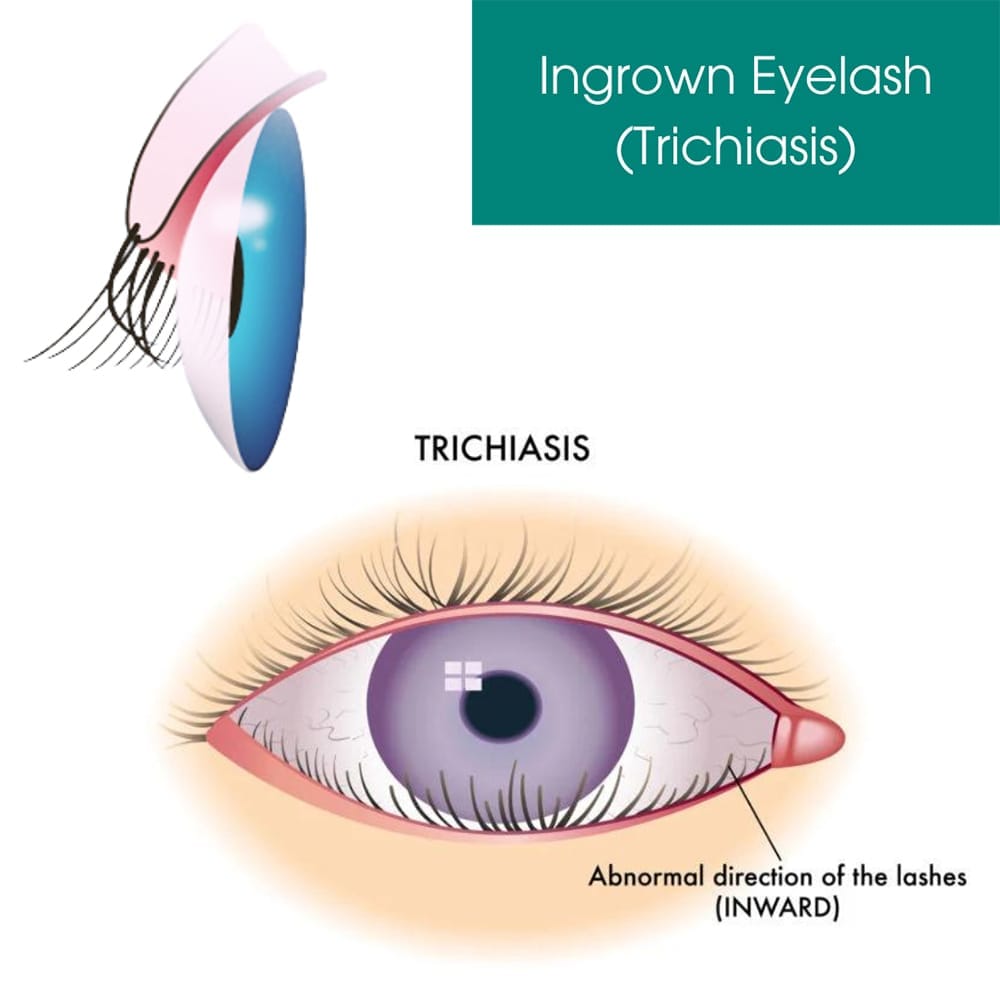Trichiasis, more commonly known as an ingrown eyelash, is a condition in which the eyelashes grow inward toward the eye, causing irritation and pain when they scrape the cornea, which is the clear front section of the eye. These eyelashes can appear normal in thickness and color, but they can also be thin, colorless and incredibly difficult to see or remove. Understanding the causes, symptoms, and how to treat an ingrown eyelash properly is important for effectively managing and preventing adverse effects.
Trichiasis can affect people of any age, but it becomes more frequent as you age due to changes in eyelid structure and an increased risk of eye conditions that lead to ingrown eyelashes. To avoid complications and possible corneal injury, don’t try to remove ingrown eyelashes yourself. Instead, rely on experienced optometrists at Eye Physicians in NYC.
Common forms of trichiasis include:
Ingrown eyelashes must be treated as soon as possible for the best outcome. Eye Physicians in Downtown Manhattan provide customized treatments as well as advanced procedures to maintain good eye health. Their timely comprehensive eye care Care offers the best possible maintenance of your eye health.

Trichiasis causes a variety of symptoms that may coincide with other eye conditions, but chronic irritation is its most noticeable characteristic. This continuous pain causes additional symptoms as your eye tries to discharge the problematic lash.
Other symptoms include:
If you don’t get ingrown eyelash treatment from an eye doctor, ingrown eyelashes can cause a variety of problems. Continuous irritation and friction against the eye’s surface can result in corneal abrasions, infections and inflammation, which may lead to visual impairment or irreversible damage. Furthermore, prolonged irritation, redness and swelling around the eye affects everyday activities and quality of life.
Several factors can lead to the formation of ingrown eyelashes. Understanding these characteristics is important for accurate diagnosis and effective ingrown eyelash treatment.
Causes may include:
Psoriasis, an inflammatory skin condition, can cause ingrown eyelashes due to eyelid inflammation and skin scaling. Inflammation limits natural lash growth, and thicker skin and scales prevent appropriate lash development, leading them to grow inward. Some psoriasis treatments may also influence lash development patterns.
Ingrown lashes are normally diagnosed after an in-depth examination of the affected eye by your New York City eye doctor. They evaluate symptoms such as pain, redness, swelling and tenderness around the eyelids. Furthermore, they can use magnification instruments to check the lash line for symptoms of ingrown hairs. Proper diagnosis is important for ruling out other eye conditions and ensuring appropriate treatment, which may include gently removing the ingrown lash or addressing any underlying issues that are causing it.
Unfortunately, ingrown lashes can’t go away on their own. To resolve this issue, you need to see your New York eye doctor. Typically, treatment options are decided by the quantity of lashes involved, the cause and your goals. Treating ingrown eyelashes, or trichiasis, includes various methods based on severity. Initial treatments may involve manual removal of the lashes, lubricating eye drops, or antibiotic ointments to reduce inflammation and prevent infection.
For persistent cases, electrolysis or laser therapy can offer a more permanent solution by destroying the hair follicles. In severe instances, surgery may be necessary to reposition or remove the follicles.
Some ingrown eyelash treatment options include:
When performed by experienced eye doctors in New York City, surgical procedures are safe and effective. Your eye doctor ensures your comfort with relaxation drugs if necessary as well as numbing creams and/or injections when a procedure might incur slight discomfort. Recovery is quick and easy as long as you follow your eye doctor’s instructions and complete your follow-up visits.
Taking certain precautions reduces risks, but genetic factors and underlying conditions can still cause ingrown lashes that require monitoring and immediate action to protect eye health.
Steps to take to prevent ingrown eyelashes include:
If you see any inflammation or ingrown lashes, you should get expert help quickly before it turns into a more complicated condition requiring surgical intervention. Take charge of your eyes’ comfort and health. If you’re experiencing pain from ingrown eyelashes, please contact the experienced treatment team at Eye Physicians in New York City.
Their skilled specialists are dedicated to delivering complete care and relief. With their expertise and dedication to your well-being, you can be confident that your condition will be adequately treated. Make your eye health a top priority.
Eye Physicians
110 Lafayette St, Suite 503
New York, NY 10013
(212) 292-4814
Entrust the care of your precious eyesight to highly skilled and experienced eye care professionals. For top-notch ophthalmologists and optometrists in Downtown Manhattan, choose Eye Physicians. Eye Physicians ensures prompt care, precise diagnosis, and personalized treatment plans.
Schedule an Appointment